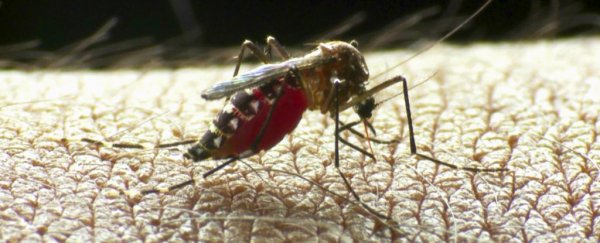An Indian biotech company says that it has two vaccine candidates against Zika virus that will be entering pre- clinical trials in animals in the coming weeks.
There's no evidence as yet on how well these vaccine candidates will perform against the mosquito-borne virus - which has been declared a global public health emergency by the World Health Organisation (WHO) - but they're the first two potential vaccines to reach this stage, which is a promising sign.
The reason we're so far from a Zika vaccine is that, until recently, the disease wasn't thought to be too serious. For most people, the symptoms only last around a week and involve fever, rash, and itchy eyes.
But then the disease started spreading rapidly throughout the Americas, and, at the start of this year, Brazil noticed a strong link between Zika virus and a dramatic increase in a condition called microcephaly, which causes babies to be born with abnormally small skulls, and potentially severe brain damage.
This link is yet to be confirmed, but the evidence is strong enough for WHO to upgrade the outbreak to the most serious level, and countries hardest hit, such as El Salvador, have even asked women to avoid planned pregnancies until 2018.
The pressure has also intensified for a potential vaccine that could be used to protect pregnant women from the disease.
It just so happened that Indian company Bharat Biotech had already been slowly working on potential Zika vaccines for the past 18 months, for the sole reason that it complemented their research into vaccines for Chikungunya and dengue fever - two other diseases spread by the Aedes aegypti mosquito.
"We never expected that the virus will become a serious issue," Krishna Ella, CEO of Bharat Biotech, told Quartz.
After spotting the similarities between the early stages of Zika, dengue, and Chikungunya, the company filed a patent for two vaccine candidates last year - although they weren't in a real hurry to develop a product.
"We thought as a company, it will be wonderful to have a combination vaccine of Japanese encephalitis, chikengunya and zika as a combined vaccine," Ella told ABC.
Since the start of the year, the pressure has been turned up a few notches, and Bharat Biotech is now ready to begin trialling the potential vaccines in animals within two weeks.
The goal of any vaccine is to stimulate a patient's immune system with a weak version of a disease so that the body will be ready to stamp out any future infections.
The first vaccine candidate Bharat Biotech will be trialling is what's known as a recombinant vaccine, which means it contains Zika DNA, but not the virus itself.
The second potential vaccine is 'inactivated', and contains whole particles of Zika virus that have been tweaked so that they can no longer replicate or cause infection - but can still trigger an immune response.
Testing these vaccine candidates on animals is expected to take around five months, and after that they'll need to be tested in humans, which means we still have a long way to go before we even know if they're going to work or not. But as the first company to patent potential compounds against Zika, Bharat Biotech is well ahead of the French and Japanese companies that have just announced they're going to start researching a vaccine.
Still, Ella thinks it'll be years before a potential vaccine could hit the market, depending on how much support the WHO will give them. "We can only produce a vaccine; the international regulatory agency has to decide how fast they want to move," he explained.
The good news is this isn't the only option we have when it comes to fighting Zika. A team of UK researchers has developed a strain of genetically modified male mosquitoes that can mate with females, but only produce offspring that will soon die out.
This is because the males have been genetically modified to require a dietary supplement that can't be found in nature, and the gene is always passed on to their offspring. In trials, this approach has been shown to wipe out 90 percent of Aedes aegypti mosquitoes.
How does that help Zika? Less mosquitoes means less risk of transmission. In the Brazilian municipality of Eldorado, where the mosquitoes have already been released, the annual number of dengue fever cases dropped from 133 to one within a year.
So far it's unclear whether this is an option that the WHO and local governments will take when it comes to fighting Zika, but with millions of people infected, and the disease poised to spread worldwide, it's clear that we need to do something, and fast.
